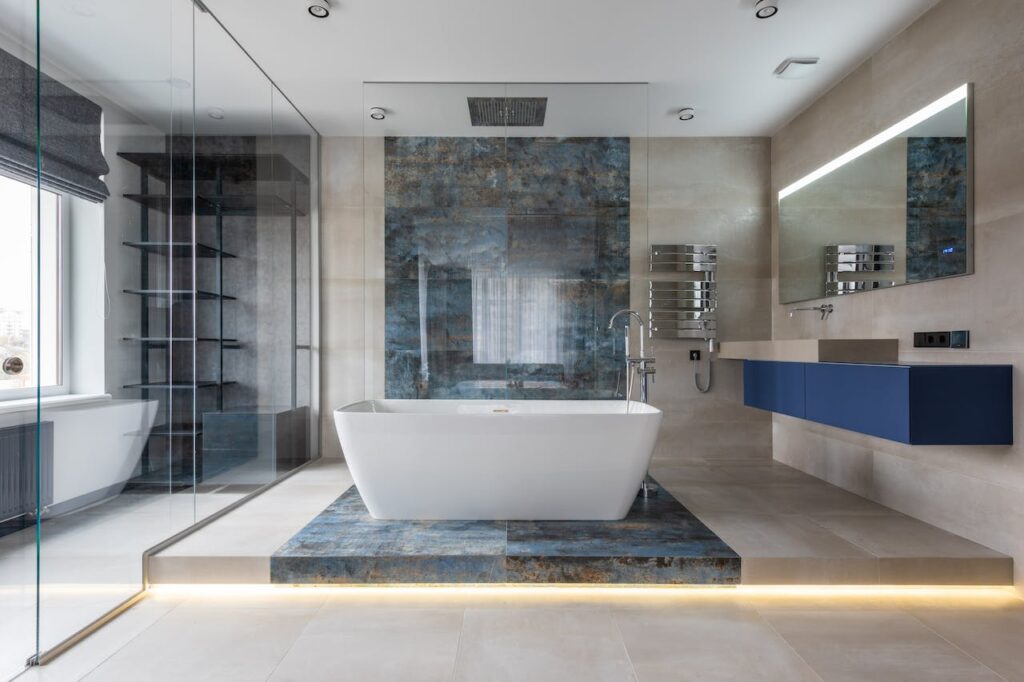Going beyond aesthetics, it’s crucial to choose a functional floor for your bathroom. With a lot of water exposure, humidity and temperature changes, the bathroom is a busy space with a lot of challenges you should prepare for.

Types of flooring for your bathroom
Tile Flooring
Ceramic, porcelain and stone tiles are classic choices for bathrooms. They’re durable and have varying levels of water resistance and proofing. Each type comes in a variety of designs and styles, making them versatile, and they’re beautiful.
Ceramic tiles are water-resistant and durable; coming in a wide range of styles, colours and patterns. They’re relatively easy to clean, except you do need to clean the grout lines to prevent mould and mildew build-up. They can be cold underfoot too, but ceramic tiles work with underfloor heating.
Porcelain tiles share a lot of characteristics with ceramic ones, but they’re less porous and usually denser. This makes them even more resistant to water, stains and other damage, which is likely why they’re often considered the best material for bathrooms. However, they can be very slippery when wet, so it’s important to treat them with a non-slip finish.
Natural stone tiles, such as marble, granite and limestone, are just as good a material as the other two. They’re durable but they require proper sealing to prevent water damage, stains and scratches, which they can be susceptible to.
Vinyl Flooring
Vinyl flooring has come a long way in terms of aesthetics and functionality. It’s available in sheets, tiles or planks with luxury vinyl tiles (LVT) being a favourite. They’re highly resistant to water, stains and scratches, whilst being a cost-effective choice, making them desirable for busy homes. As durable as they are, vinyl floors are prone to tearing and denting as they have a soft surface.
Laminate Flooring
Like vinyl, laminate floors are another budget-friendly option. They’re durable and you can choose waterproof or water-resistant laminate for the bathroom. It’s worth noting that they can be slippery when wet, so it’s good to have bathmats!
Environmentally Friendly Flooring
Bamboo and cork flooring have grown in popularity. They’re environmentally friendly options that come from sustainable materials. They’re durable and comfortable underfoot. Bamboo flooring is naturally water-resistant to an extent and is known to be stronger than wood, making it a durable floor for your bathroom. However, it can be susceptible to scratches and dents.
Cork flooring is very similar and a smart choice for your bathroom. It’s resistant to mould, mildew and water damage. Although it isn’t waterproof, it’s still water-resistant, and it can become dented or scratched.
Wood Flooring
Whether it’s solid wood or engineered wood, these floors are notorious for their beauty and durability. But they aren’t the best choice for a bathroom. Depending on the humidity and moisture, wood naturally shrinks and swells. However, engineered wooden flooring is a better choice if you’re adamant about oak flooring in your bathroom as it’s designed to be more durable.
Which Floor is Right?
When it comes to choosing the right flooring for your bathroom, it can be tricky. You need to balance functionality, practicality and durability with aesthetics and style. Each has its own advantages and disadvantages, so it’s essential to understand what you’re after and what your budget is.
By considering water resistance, maintenance requirements, durability and comfort, you’ll be able to make the decision that works best for you and your home.

